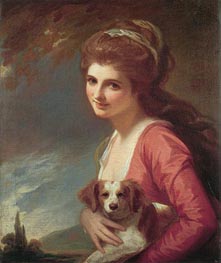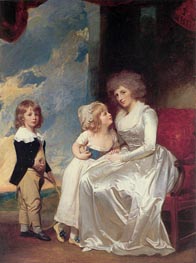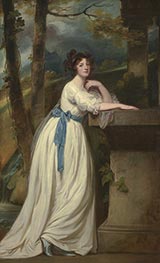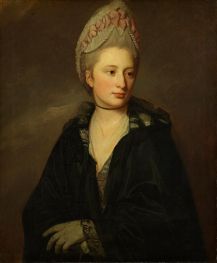
George Romney Painting Reproductions 1 of 1
1734-1802
English Rococo Painter
George Romney was an English portrait painter who lived from December 26, 1734, to November 15, 1802. He was a prominent figure in 18th-century British art, known for his captivating portraits.
George Romney was born in Dalton-in-Furness, Lancashire, England. His father, John Romney, was a cabinetmaker, and his mother, Ann Simpson, came from a family of artists. Romney initially trained as a cabinetmaker but showed a keen interest in art. He studied drawing and painting under local artists before moving to Kendal, where he apprenticed with the portrait painter Christopher Steele.
In 1762, Romney moved to London to further his artistic career. He initially struggled to establish himself and faced financial difficulties. However, he gained recognition and began receiving portrait commissions from aristocratic patrons. He also became a member of the Society of Artists of Great Britain.
Romney was influenced by the works of renowned painters such as Anthony van Dyck and Peter Paul Rubens. He admired the loose brushwork and vibrant colors of the Venetian School. His style evolved over time, characterized by soft, delicate brushwork, and a talent for capturing the likeness and character of his sitters.
Romney's portraits were renowned for their naturalism and emotional depth. He had a remarkable ability to portray his subjects with sensitivity and authenticity. His subjects ranged from royalty and nobility to intellectuals, actors, and other figures of prominence. His portrait of Emma, Lady Hamilton, became one of his most famous works.
Romney's success brought him into competition with the leading portrait painter of the time, Sir Joshua Reynolds. The two artists vied for commissions and recognition. Although Romney had a devoted following, Reynolds enjoyed greater popularity and influence. Their rivalry impacted Romney's career, as Reynolds had a significant influence on the taste and trends of the art market.
Romney had a complicated personal life. He married Mary Abbott in 1756, and they had one son together. However, their relationship was tumultuous, and they lived apart for much of their married life. Romney formed close relationships with a number of women, including his muse and model, Emma, Lady Hamilton. She inspired many of his paintings and became his most famous sitter.
In the late 1790s, Romney's health began to decline, and he gradually withdrew from public life. He spent his final years in Kendal, working on personal projects. Despite his earlier success, Romney's reputation waned in the face of changing artistic tastes and the rise of the Neoclassical style. He died in Kendal at the age of 67.
George Romney's contributions to British portraiture during the 18th century were significant. His ability to capture the essence of his subjects, combined with his masterful technique, left a lasting impact on the art world. Today, his works are housed in prestigious galleries and collections, and he is recognized as one of the leading portrait painters of his era.
George Romney was born in Dalton-in-Furness, Lancashire, England. His father, John Romney, was a cabinetmaker, and his mother, Ann Simpson, came from a family of artists. Romney initially trained as a cabinetmaker but showed a keen interest in art. He studied drawing and painting under local artists before moving to Kendal, where he apprenticed with the portrait painter Christopher Steele.
In 1762, Romney moved to London to further his artistic career. He initially struggled to establish himself and faced financial difficulties. However, he gained recognition and began receiving portrait commissions from aristocratic patrons. He also became a member of the Society of Artists of Great Britain.
Romney was influenced by the works of renowned painters such as Anthony van Dyck and Peter Paul Rubens. He admired the loose brushwork and vibrant colors of the Venetian School. His style evolved over time, characterized by soft, delicate brushwork, and a talent for capturing the likeness and character of his sitters.
Romney's portraits were renowned for their naturalism and emotional depth. He had a remarkable ability to portray his subjects with sensitivity and authenticity. His subjects ranged from royalty and nobility to intellectuals, actors, and other figures of prominence. His portrait of Emma, Lady Hamilton, became one of his most famous works.
Romney's success brought him into competition with the leading portrait painter of the time, Sir Joshua Reynolds. The two artists vied for commissions and recognition. Although Romney had a devoted following, Reynolds enjoyed greater popularity and influence. Their rivalry impacted Romney's career, as Reynolds had a significant influence on the taste and trends of the art market.
Romney had a complicated personal life. He married Mary Abbott in 1756, and they had one son together. However, their relationship was tumultuous, and they lived apart for much of their married life. Romney formed close relationships with a number of women, including his muse and model, Emma, Lady Hamilton. She inspired many of his paintings and became his most famous sitter.
In the late 1790s, Romney's health began to decline, and he gradually withdrew from public life. He spent his final years in Kendal, working on personal projects. Despite his earlier success, Romney's reputation waned in the face of changing artistic tastes and the rise of the Neoclassical style. He died in Kendal at the age of 67.
George Romney's contributions to British portraiture during the 18th century were significant. His ability to capture the essence of his subjects, combined with his masterful technique, left a lasting impact on the art world. Today, his works are housed in prestigious galleries and collections, and he is recognized as one of the leading portrait painters of his era.
4 George Romney Paintings

Lady Hamilton as 'Nature' 1782
Oil Painting
$1022
$1022
Canvas Print
$63.16
$63.16
SKU: ROG-3204
George Romney
Original Size: 76 x 63 cm
Frick Collection, New York, USA
George Romney
Original Size: 76 x 63 cm
Frick Collection, New York, USA

The Countess of Warwick and Her Children c.1787/89
Oil Painting
$1786
$1786
Canvas Print
$55.77
$55.77
SKU: ROG-3205
George Romney
Original Size: 202.6 x 156.2 cm
Frick Collection, New York, USA
George Romney
Original Size: 202.6 x 156.2 cm
Frick Collection, New York, USA

Portrait of Mrs. Andrew Reid c.1780/88
Oil Painting
$2014
$2014
Canvas Print
$50.59
$50.59
SKU: ROG-17589
George Romney
Original Size: 233.4 x 144.2 cm
Kimbell Art Museum, Fort Worth, USA
George Romney
Original Size: 233.4 x 144.2 cm
Kimbell Art Museum, Fort Worth, USA

Portrait of Georgiana, Lady Greville c.1771/72
Oil Painting
$939
$939
Canvas Print
$63.43
$63.43
SKU: ROG-19612
George Romney
Original Size: 76.2 x 63.5 cm
Courtauld Institute of Art, London, United Kingdom
George Romney
Original Size: 76.2 x 63.5 cm
Courtauld Institute of Art, London, United Kingdom